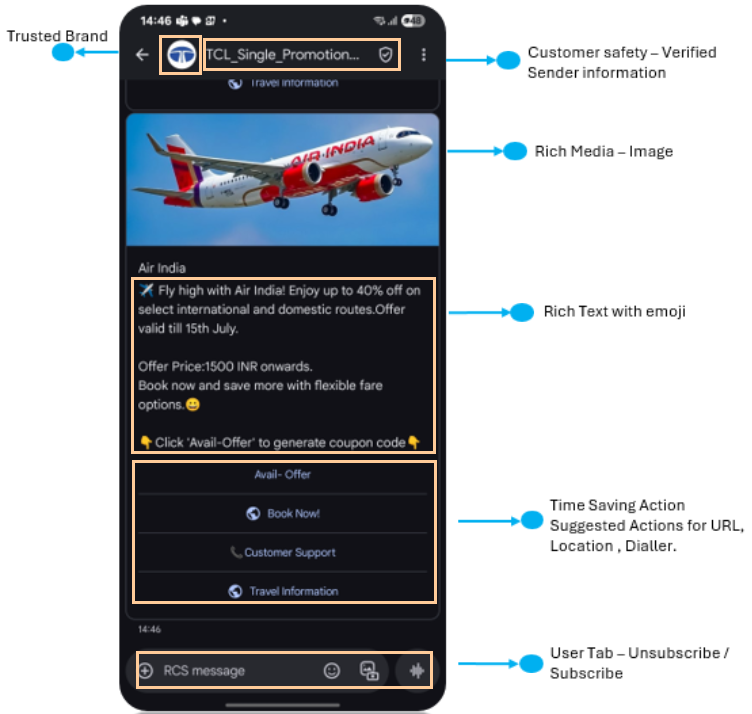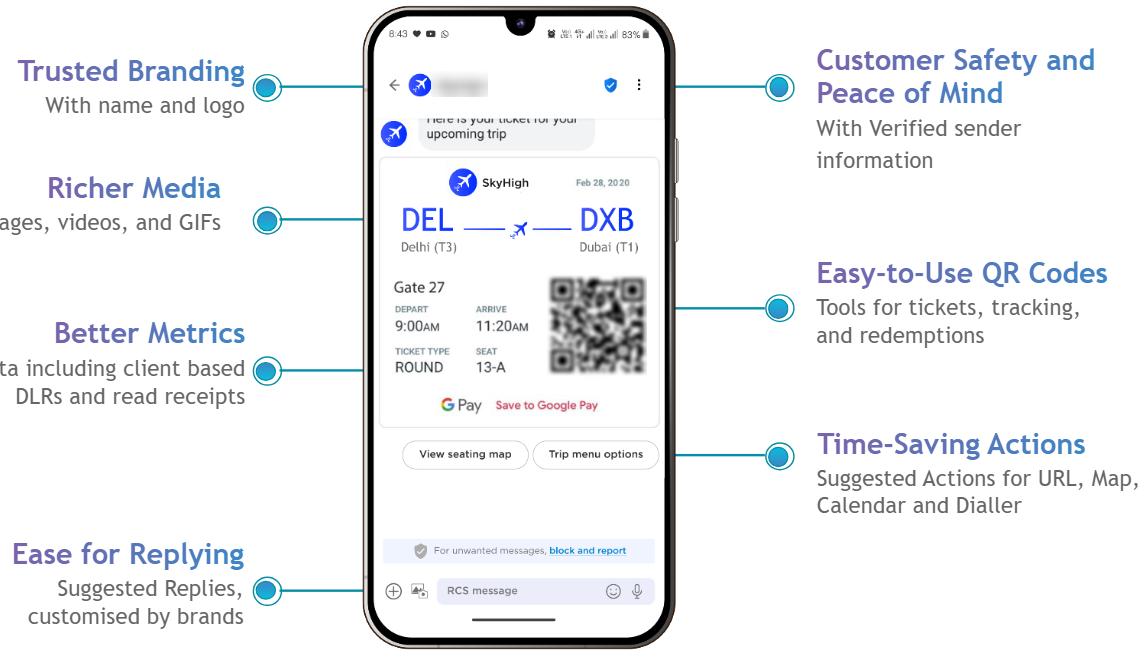Overview
An overview of RCS features and its benefits.
Rich Communication Services (RCS)
SMS has been the most popular channel for enterprise business communications with customers for a long time. However, in digital times, there is a growing demand for a communication service that offers more advanced messaging capabilities that span beyond simple text that an SMS can support. In this context comes the 'Rich Communication Service (RCS)', a promising messaging solution that offers advanced messaging features that cater to the demands of the new age business communication.
The 'Rich Communication Services (RCS)' is communication protocol with rich messaging capabilities. RCS is designed to enhance the native messaging application with capabilities such as, read receipts, typing indicators, high-quality images, videos, interactive elements, and the seamless interoperability between the Android and the Apple mobile devices. RCS offers a richer, more dynamic, and modern chat application experience; RCS does not limit the character count or the file size and does not require a specific application to be installed on the end-user’s devices like other OTT chat applications.
In addition to its rich messaging capabilities, the RCS also comes with business-critical features such as, verified sender identity, enhanced security with end-to-end encryption, faster response with 'quick reply' buttons, and enhanced reporting feature that can track the user engagement.
This way, RCS enables the businesses to send trusted messages using a verified sender id, directly to a recipient’s default messaging app (without the need for any specific app).
RCS Business Use Cases
- Marketing/Promotional campaigns—promotions/coupons, product launch, seasonal campaign, and event invitations.
- Transactional communications—order updates, order confirmations, loyalty program updates, password resets, authentication, fraud alerts, survey, and appointment alerts.
- Customer service/automated workflows—caretaker services, delivery notifications, account notifications, service outage notifications, and feedback request.
Key Advantages of RCS over SMS/MMS
RCS takes the mobile messaging to the next level with many advanced features such as, higher security, brand verification, real-time delivery, read receipts, typing indicators, carousels, high-quality images, and videos, suggested replies and buttons that together present an ‘app-like’ experience. The interoperability between Android and Apple mobile devices is seamless for RCS and is integrated into the mobile phone’s native messaging app.
An image of an RCS message with its key features is shown below.

- Trusted Brand—The brand logo in the message gives end-customers the assurance that the message is from a trusted brand.
- Customer safety—The verified sender ID information ensures the message is verified by the business/brand.
- Rich Text with emojis—The rich text with emojis offers a more engaged messaging experience.
- Rich Media—The rich images offer a better visual experience of the service or the products from the brand.
- Time Saving Actions—The suggestive replies and buttons to click on an URL, location map, or the dialler provide a quick and easy actions to the end-customers.
- User Tab—The user tab that allows the end-customers to either subscribe to the RCS feature or unsubscribe to it, is made readily available.
RCS Business Messaging (RBM)
The 'RCS Business Messaging' (RBM) is the communication tool based on RCS and developed specifically to address the needs of A2P and P2A messaging that transforms the traditional messaging based on SMS or MMS into a dynamic platform with high-resolution images, large file sharing, delivery, and read receipts on the default messaging application with a verified sender profile using the RCS protocol. Using RBM, the businesses can send rich and interactive messages, directly to a recipient’s default messaging application over a verified sender profile. RBM includes the messaging between businesses and individuals on supported Carrier Networks and mobile devices (application-to-person | business-to-consumer).
With all the key players with platforms such as Apple, and Android supporting RCS with multiple features, RCS is set to become one of the most advanced messaging protocols.
RBM supports sending the following message types:
- Basic Message—a text only message that can be sent using the SMS channel is now sent over the RCS with a brand’s logo and a verified trust mark.
- Single A2P Message—brands can send richer, more engaging messages with rich media such as images, videos, rich cards over RCS with enhanced branding and a verified sender. These messages include only the non-conversational RCS messages.
Note:Both Basic messages and single A2P messages support bulk messaging and campaigns.
- Conversational Messages—conversational, authentication, and notification messaging features with enhanced customer engagement.
A globally unified RCS solution is expected to support all types of messages.
An RCS Business Messaging (RBM) A2P message as displayed on the end-usera mobile phone is shown below with its key benefits.

RBM Agent
An RBM agent is a fully verified and validated entity that represents a brand (business/enterprise) to instil credibility and reliability. Just like the SMS messages are sent using the short codes, the RBM messages are delivered through a verified sender ID. These messages are branded with the brand logo, slogan, colour scheme, and business details, creating a more secure and trustworthy experience for customers when they engage with a brand.
Messaging-as-a-Platform Service
As an RBM service provider, k.io is seamlessly integrated with 'Messaging-as-a-Platform' (MaaP) infrastructure providers. TC is continuously expanding its partnerships with supported Carrier Networks to deliver broader global coverage and simplifying the RBM integration for businesses through its robust CIS platform.
Device Compatibility for RCS
Both Google Messages and Apple iMessages support RCS as part of their messaging platforms. However, the feature reach may vary based on default messaging settings and whether the users have these services enabled.
- Android devices with software version 5.0 or higher are RCS and RBM compatible, when these services are supported by both the device manufacturer and the carrier network and are enabled on the device.
- Apple devices with iOS version 18 or higher are RCS compatible, when the service is supported by the carrier network and enabled on the device.The RBM support is more limited and requires activation by Apple and the service is supported by the carrier network and enabled on the device.
Note:Businesses must ensure that the customer consent to obtained before sending the RCS messages to the customer.
Enable RCS on Mobile Devices
This section describes the steps to enable RCS on Android and iOS devices.
RCS on Android Devices
The Android OEMs have partnered with Google to have Google Messages pre-installed as the default messaging app with ‘RCS Chats’ being enabled by default for new and existing mobile users unless they have previously disabled it manually. The RCS and RBM services are bundled into one setting in Android devices.
To enable RCS on an Android device, perform the following steps:
- Open Google Messages.
- Tap Profile Image.
- Select Messages Settings.
- Select RCS chats.
- Toggle on RCS chats.
RCS on iOS Devices
Apple’s iMessage app is pre-installed as the default messaging app on all iPhones; however, RCS and RBM are not enabled by default. Mobile users must toggle on ‘RCS Messaging’ in the app settings to take advantage of these services.If a Carrier Network does not support RCS or RBM, the feature toggle is not accessible on the mobile device/visible in the messaging application settings.
To Enable RCS on an iOS device, perform the following steps:
- Open Device Settings.
- Tap Apps.
- Select Messages.
- Under the Text Message section, select RCS Messaging.
- Toggle the RCS Messaging option.
- Toggle the RCS Business Messaging option.
For information related to RCS APIs see, RCS APIs Overview
Updated 5 months ago
